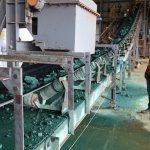Google and WWF team up to make fashion supply chains sustainable

- The textile industry is responsible for 20% of industrial wastewater worldwide
- Tech giant Google will deploy their cloud technologies to help reduce the environmental impact of the fashion sector
Google Cloud this week teamed up with wildlife charity WWF Sweden to develop an environmental data platform that will focus on sustainable sourcing, helping the fashion industry boost its environmental efforts.
The joint project aims to create a platform that allows fashion brands to monitor the environmental impact of their supply chains and adapt accordingly to support green initiatives.
The fashion industry has a major environmental impact globally. The World Bank predicts that 20% of industrial wastewater pollution worldwide is contributed by the textile industry. The washing of textiles, which releases plastic microfibers into the ocean, is estimated to accumulate to an excess of 22 million tonnes between 2015 and 2050.
A report by Quantis, meanwhile, revealed that the fashion industry accounts for 2-8% of greenhouse gas emissions globally and could reach up to 50% by 2030 unless action is taken.
While much of this impact originates from the raw material stage in a production process, fragmented supply chains, which span multiple countries, make data collection and analytics – and subsequent optimization – a challenge.
This is where Google and WWF Sweden plan to intervene. The two companies are looking to access that untapped data to aid fashion brands in evaluating the impact of their decisions.
Leveraging Google’s data-crunching power and WWF’s knowledge of raw materials assessment, the program will focus on cotton and viscose initially and soon expand to other varieties of raw materials to provide a more holistic view of the supply chain.
The goal is to provide fashion suppliers with data-driven insight into the sustainability of their supply chains and where they can improve it.
For instance, adding transparency and visibility when accessing sourcing locations, monitoring the level of air pollution, and the availability of water sources. By using Google Earth’s environmental information and AI technology to process data, the tech giant hopes to fill in the gaps when it comes to sustainable sourcing.
“It’s our ambition to create a data-enriched decision-making platform that enables analysis of the supply chain in a way that has not been possible before at this scale,” Ian Pattinson, Head of Customer Engineering for Retail at Google UK said.
“Partnering with WWF brings together Google Cloud’s technical capacity, including big-data analysis and machine learning, and WWF’s deep knowledge of assessing raw materials.”
This may seem like new territory for search giant Google, but last year, at the Copenhagen Fashion Summit, Google teamed up with fashion brand Stella McCartney in a pilot program enlisting Google cloud technology to promote sustainability in the fashion industry.
The collaboration between Google and Stella McCartney aimed to determine the impact of raw material production and compare the impact it carries in different regions, enabling fashion companies to have more insights in clothing manufacturing at the early stages of supply chains.
In a similar vein, the partnership between Google and WWF Sweden falls in line with the push for more awareness and transparency in the processing of textiles and raw materials as well as the environmental impact.
YOU MIGHT LIKE

The pressure is mounting for sustainable supply chains
Kate Brandt, Google Sustainability Officer, said, “Sustainability is a challenge that crosses industry boundaries, and we firmly believe that solutions require strong partnerships and collaboration.
“Our ambition is to fill fundamental data gaps by bringing greater accuracy to environmental reporting — ultimately moving toward more sustainable processes.”
Brands are facing more pressure than ever today to prove that their supply chains are sustainable, and while there are a number of challenges in achieving it, as supply chains recover from disruption caused by COVID-19, now is the best time to rethink processes. There’s commercial advantage in doing so.
“In 2019, we saw sustainability play a bigger role in supply chain operations,” Marcus Harvey, Sales Director EMEA at Targus, previously told TechHQ.
“We saw resellers and enterprises alike demanding eco-friendly operations from their supply chain. High sustainability standards are being rolled out across the board as businesses and their environmental policies ripple down the supply chain.
“[…] consumers now expect companies to deliver on sustainability to help save the planet. In fact, we expect that in the near future, brands that are not consciously making efforts to heighten their eco-friendly practices will increasingly find themselves losing market share and consumer support.”
In parallel, other tech giants are also noted to follow a common initiative to push sustainability and responsibly sourced materials. Recently, a hike in demand for fresh salmon has highlighted the role of technology in ensuring trust and transparency in the supply chain.
Kvarøy Arctic (pronounced “Kwa-ray”), a major producer of Norwegian farmed salmon for stores such as Whole Foods, announced they will join IBM’s Blockchain-based Food Trust.
In a bid to enhance the traceability of their Arctic salmon and reassure consumers of the source of seafood, the Norwegian company has enlisted blockchain-inspired technology to provide information on product origin.









